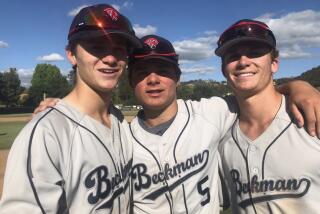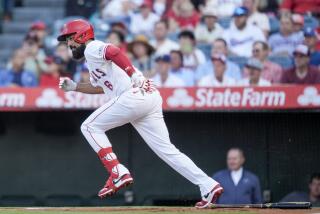After Taking Long Trip to Majors, Rohde Takes It a Game at a Time
- Share via
SAN DIEGO — The organist at Jack Murphy Stadium had just broken into his supermarket-music rendition of “There’s a Kind of Hush (All Over The World)” when Houston Astro rookie David Rohde stepped into the cage during batting practice.
Crack! Rohde sent a fastball to left center.
Crack! Rohde lined one to short.
Crack! Rohde slammed another toward the left-field bleachers.
Moments later, Rohde rushed out to the infield. As catcher Craig Biggio hit sharp grounders, Rohde, a second baseman, fielded the balls deftly.
Pregame practice, however, was as close as Rohde, 26, who attended Corona del Mar High School and Saddleback College, would get to playing this particular evening.
Although Rohde has played in only 20 games since being recalled June 19 from triple-A Tucson (33 games total at the major league level), he is not complaining.
“You take advantage of what you’re given,” said Rohde, a soft-spoken, confident young man. “You work hard and do what you can with the at-bats you get.”
That credo, standard as it sounds, has been Rohde’s cornerstone the past several years. It has guided Rohde, only an above-average player in high school, to a steady climb up the baseball ladder.
Few believed he would get so far.
As a high school junior and third baseman in 1981, Rohde helped Corona del Mar to the Southern Section 2-A championship. In 1982, he was the Sea Kings’ No. 1 pitcher, going 9-0 with a no-hitter against Saddleback.
Still, there were no recruiters interested in Rohde when he graduated. “He didn’t even have a junior college coach after him,” said his mother, Marge Rohde.
Corona del Mar Athletic Director Jerry Jelnick, who coached Rohde as a freshman and a sophomore, said, “He was just one of those kinds of kids that you looked at and the scouts looked at and no one got really excited about.”
Rohde played one year at Cuesta College and another at Saddleback--where he batted .314 overall, .340 in Pacific Coast Conference play--before walking on at Arizona. But at Arizona, persistent back problems forced Rohde to redshirt his junior year.
Because several orthopedic surgeons could not determine what was causing his back pain, Rohde--who would try to practice and play with the Arizona junior varsity when he was able--tried to keep his pain to himself. It wasn’t until March of his junior year that a chiropractor finally determined that Rohde’s back was out of proper alignment.
“I did not have great plans for David (as a senior). I didn’t think he was capable of winning a regular position after his junior year,” Arizona Coach Jerry Kindall said. “But because he never complained of the pain, we didn’t realize then the extent of his injuries.
“We got very little inkling of what the real David could do. He would come out and try to play but . . . his back prevented it. But David is a tremendous worker. When he came back as a senior, I saw an all-together different player. It was like a revelation. He won the starting job very quickly.”
And he proved his worth as a collegiate player.
As Arizona’s starting shortstop, Rohde batted .336 and helped the Wildcats to the 1986 College World Series championship.
“I can say, without equivocation, we would not have won the College World Series without David,” Kindall said. “I have tremendous regard for him, having seen him make his way through those disappointments.”
Suddenly, Rohde began drawing favorable reviews from scouts as well, and in the June 1986 draft, he was selected by the Astros in the fifth round. From there, he made a steady climb from Class-A Auburn (N.Y.) and Osceola (Fla.), to double-A Columbus (Ga.) to triple-A Tucson.
In 1987, in the Arizona Instructional League, Rohde took his first stab at switch-hitting. Although he was unsuccessful at first, Rohde stuck with it until he finally was adept from both sides of the plate.
“The good thing about David is he’s a very confident kid,” said Astros scout Clark Crist. “He’s smart and thinks about what he is doing. But the biggest plus is he taught himself to switch hit.
“Right when it seemed like it wasn’t working, he stayed with it and really made the adjustment. It was his determination that made the difference. He’s probably the hardest working kid that I’ve ever seen. Really. You’ll hear that from anyone you’ll talk to.”
At this, Rohde just shrugs. Taking extra batting practice, doing extra conditioning, not allowing distractions to cut into his life of baseball. . . . It’s all part of the game, he says.
“It’s just something I’ve had to do,” Rohde said. “I would have loved to just plan on playing in the major leagues, but I took it one step at a time. It’s what I’ve done all along. You make adjustments along the way. Know your abilities. . . . Know your limitations.
“You take advantage of what you have. I use my head and know how the game is played.”
After batting .291 for Tucson last year, Rohde was invited to play winter ball in Venezuela. He was named the club’s most valuable player despite having his playing time cut short by an emergency appendectomy.
“I started getting stomach cramps, but I just thought it was something I had eaten,” he said. “I kept cutting things out of my diet, but it didn’t help. I played the night before I had surgery.”
Despite being out for nearly a month, Rohde was invited to the Astros’ spring training camp and made the roster. But after going two for 11 in 13 games, he was sent back to Tucson, where he hit .350.
“For a lot of guys, being sent down is a real downer and real difficult to get in the right frame of mind,” Crist said. “But David went down and hit .350. He didn’t get discouraged, he just showed people he was deserving of being in the majors.”
Said Rohde: “You’ve got to prove yourself each step of the way. There are always people pointing fingers that you’re not going to make it. I guess that inspired me more than anything else.”
Since being recalled from Tucson, Rohde has been fairly successful--he’s nine for 39 in 20 games--considering the few times he has been to the plate. His highlight was a three-for-three performance July 18 against the New York Mets.
Low point? When Rohde collided with right fielder Javier Ortiz after backpedaling into shallow right field for a pop fly in the ninth inning July 24 against Atlanta.
Before the collision, Atlantatrailed, 8-7, with a man on second and two outs. But the error--charged to Ortiz--brought in the tying run and the Braves went on to win, 9-8.
Rohde, who has had only three at-bats since that game, knows the minor leagues are just a quick transaction and plane flight away.
“I’m not really worried about that. I can’t control those things,” he said. “Every time I get to play, I get to learn a little more. Right now, I’m just happy to get the opportunity.”
And though he acts confident and secure around his veteran Astro teammates, Rohde does admit that every once in awhile, he stops and realizes how far he has come.
“It was kind of weird batting against Orel Hershiser,” Rohde said. “It was like, it wasn’t TV. I was actually batting against Orel Hershiser. “
More to Read
Go beyond the scoreboard
Get the latest on L.A.'s teams in the daily Sports Report newsletter.
You may occasionally receive promotional content from the Los Angeles Times.










